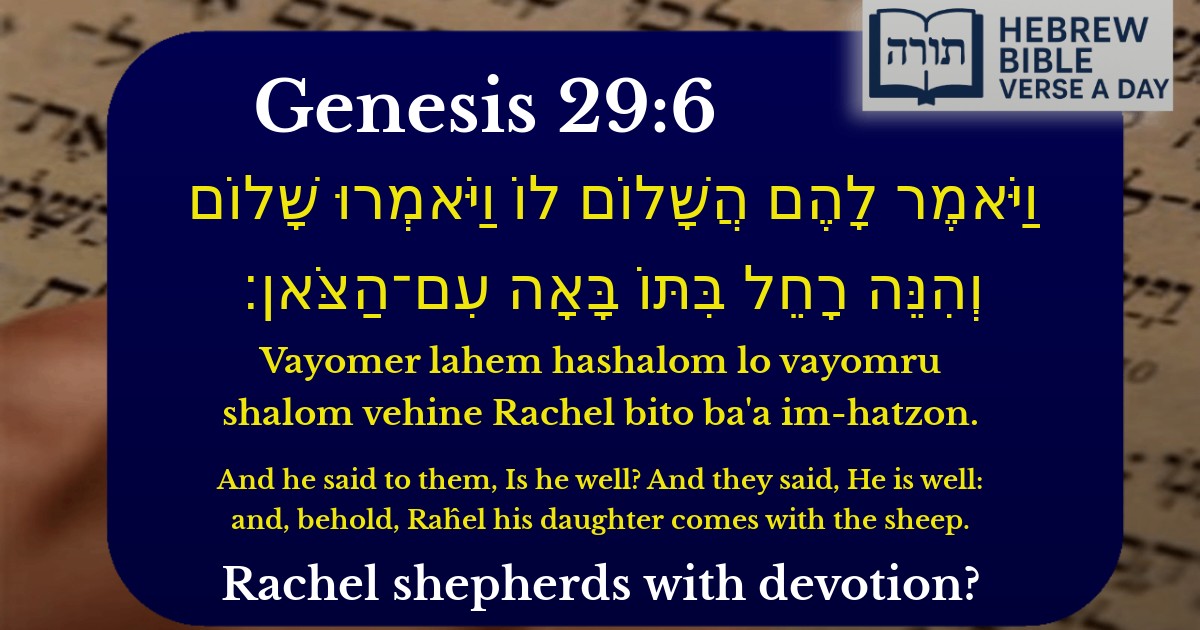Join Our Newsletter To Be Informed When New Videos Are Posted
Join the thousands of fellow Studends who rely on our videos to learn how to read the bible in Hebrew for free!
Hebrew Text
וַיֹּאמֶר לָהֶם הֲשָׁלוֹם לוֹ וַיֹּאמְרוּ שָׁלוֹם וְהִנֵּה רָחֵל בִּתּוֹ בָּאָה עִם־הַצֹּאן׃
English Translation
And he said to them, Is he well? And they said, He is well: and, behold, Raĥel his daughter comes with the sheep.
Transliteration
Vayomer lahem hashalom lo vayomru shalom vehine Rachel bito ba'a im-hatzon.
Hebrew Leining Text
וַיֹּ֥אמֶר לָהֶ֖ם הֲשָׁל֣וֹם ל֑וֹ וַיֹּאמְר֣וּ שָׁל֔וֹם וְהִנֵּה֙ רָחֵ֣ל בִּתּ֔וֹ בָּאָ֖ה עִם־הַצֹּֽאן׃
וַיֹּ֥אמֶר לָהֶ֖ם הֲשָׁל֣וֹם ל֑וֹ וַיֹּאמְר֣וּ שָׁל֔וֹם וְהִנֵּה֙ רָחֵ֣ל בִּתּ֔וֹ בָּאָ֖ה עִם־הַצֹּֽאן׃
🎵 Listen to leining
Parasha Commentary
📚 Talmud Citations
This verse is quoted in the Talmud.
📖 Megillah 13b
The verse is referenced in the context of discussing Rachel's beauty and her role in the narrative of Jacob's life.
📖 Bava Batra 123a
The verse is cited in a discussion about the lineage and characteristics of Rachel, emphasizing her importance in the biblical narrative.


Context in the Torah
The verse appears in Bereishit (Genesis) 29:6, where Yaakov arrives in Charan and inquires about his uncle Lavan's welfare from the shepherds at the well. The shepherds respond that Lavan is well, and they point out that Rachel, his daughter, is approaching with the flock.
Rashi's Commentary
Rashi (Rabbi Shlomo Yitzchaki) explains that Yaakov's question, "הֲשָׁלוֹם לוֹ" ("Is he well?"), demonstrates proper derech eretz (respectful conduct). Even though Yaakov was weary from his journey, he first inquired about Lavan's welfare before asking about Rachel. The shepherds' response, "שָׁלוֹם" ("He is well"), indicates that Lavan was in good health and that his affairs were prosperous.
Rachel's Arrival with the Sheep
The mention of Rachel coming with the sheep is significant. The Midrash (Bereishit Rabbah 70:11) notes that Rachel was a shepherdess, which was unusual for a woman of her status (as Lavan was a wealthy man). This highlights her righteousness and humility, as she willingly took on physical labor rather than relying on her father's wealth. The Kli Yakar (Rabbi Shlomo Ephraim Luntschitz) adds that this foreshadowed her future role as a matriarch who would endure hardship for the sake of the Jewish people.
Yaakov's Immediate Recognition
The Or HaChaim (Rabbi Chaim ibn Attar) observes that the verse emphasizes "וְהִנֵּה" ("and behold"), indicating that Yaakov immediately recognized Rachel as his destined wife. This aligns with the Talmudic teaching (Moed Katan 18b) that Heaven orchestrates meetings between soulmates, and Yaakov sensed this divine providence upon seeing her.
Lessons in Middot (Character Traits)